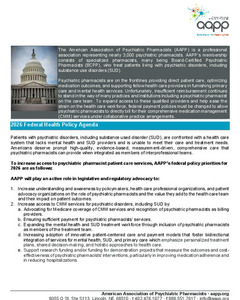
The American Association of Psychiatric Pharmacists (AAPP) is a professional association representing nearly 3,000 psychiatric pharmacists. AAPP’s membership consists of specialized pharmacists, many being Board-Certified Psychiatric Pharmacists (BCPP), who treat patients living with psychiatric disorders, including substance use disorders (SUD).
Psychiatric pharmacists are on the frontlines providing direct patient care, optimizing medication outcomes, and supporting fellow health care providers in furnishing primary care and mental health services. Unfortunately, insufficient reimbursement continues to stand in the way of many practices and institutions including a psychiatric pharmacist on the care team. To expand access to these qualified providers and help ease the strain on the health care workforce, federal payment policies must be changed to allow psychiatric pharmacists to directly bill for their comprehensive medication management (CMM) services under collaborative practice arrangements.
Patients with psychiatric disorders, including substance used disorder (SUD), are confronted with a health care system that lacks mental health and SUD providers and is unable to meet their care and treatment needs. Americans deserve prompt high-quality, evidence-based, measurement-driven, comprehensive care that psychiatric pharmacists can provide when integrated as members of interprofessional teams.
To increase access to psychiatric pharmacist patient care services, AAPP’s federal policy priorities for 2026 are as follows:
AAPP will play an active role in legislative and regulatory advocacy to:
- Increase understanding and awareness by policymakers, health care professional organizations, and patient advocacy organizations on the role of psychiatric pharmacists and the value they add to the health care team and their impact on patient outcomes.
- Increase access to CMM services for psychiatric disorders, including SUD, by:
- Advocating for Medicare coverage of CMM services and recognition of psychiatric pharmacists as billing providers.
- Ensuring sufficient payment for psychiatric pharmacists’ services.
- Expanding the mental health and SUD treatment workforce through inclusion of psychiatric pharmacists as members of the treatment team.
- Increasing adoption of innovative patient-centered care and payment models that foster bidirectional integration of services for mental health, SUD, and primary care which emphasize personalized treatment plans, shared decision-making, and holistic approaches to health care.
- Support research funding and/or funding for demonstration projects that measure the outcomes and cost-effectiveness of psychiatric pharmacists' interventions, particularly in improving medication adherence and in reducing hospitalizations.
AAPP will actively work with key partners to advance legislative and regulatory policies to:
- Maintain access to psychiatric and SUD treatment services provided through telehealth, including removing initial in-person visit requirements and allowing prescribing of controlled substances.
- Advocate for policies that increase access and remove barriers to evidence-based medications for the treatment of mental health and SUDs including:
- Recommending that federal agencies remove regulatory barriers that impede patient access to medications.
- Enforcing the Mental Health Parity and Addiction Equity Act of 2008.
- Simplifying FDA Risk Evaluation and Mitigation Strategies (REMS) that significantly impact patient care and access to medication.
- Addressing structural and policy barriers that result in shortages of medication.
- Minimizing the use of and standardizing the process for utilization management, including prior authorization and step therapy protocols by health plans.
- Maintaining the six protected classes of covered medications in Medicare Part D.
- Expanding methadone treatment beyond the Opioid Treatment Program (OTP) setting, including take-home doses for stable patients and pick-up doses at pharmacies.
- Implementing low barrier access to telemedicine for treatment of psychiatric and SUDs that includes the prescribing of controlled substances while maintaining appropriate safeguards.
- Supporting street medicine care models given the absence of Drug Enforcement Administration (DEA) laws in this area.
- Supporting overdose and infectious disease prevention interventions.
- Increase the psychiatric pharmacist workforce by:
- Increasing CMS funding for psychiatric pharmacy residency training including pharmacy residency (PGY1) and psychiatric pharmacy residency (PGY2) training.
- Including psychiatric pharmacists in Health Resources and Services Administration (HRSA) training and scholarship programs and National Health Service Corp student loan repayment programs.
- Maintain access to affordable public and private health insurance coverage of mental health and SUD services.
- Maintain the 340B Drug Pricing Program (340B) as essential in providing low-income patients access to medically necessary medications.
- Advocate for robust funding for federal agencies that provide or support mental health and SUD services, research, and training programs including:
- Research on treatments for stimulant use disorder.
- Prevent suicide by ensuring timely access to mental health care, including access to psychiatric pharmacists.
- Reduce stigma and dispel mental health myths and misperceptions perpetuated around individuals living with mental illness, including those with substance use and neurologic disorders
